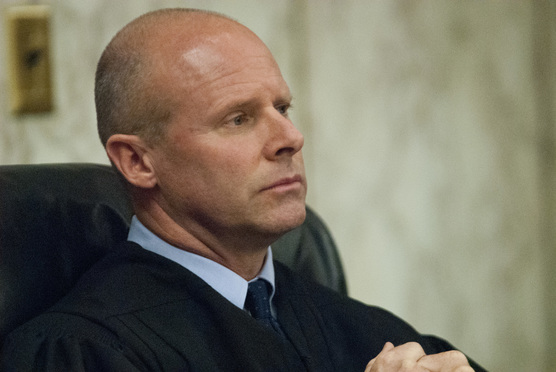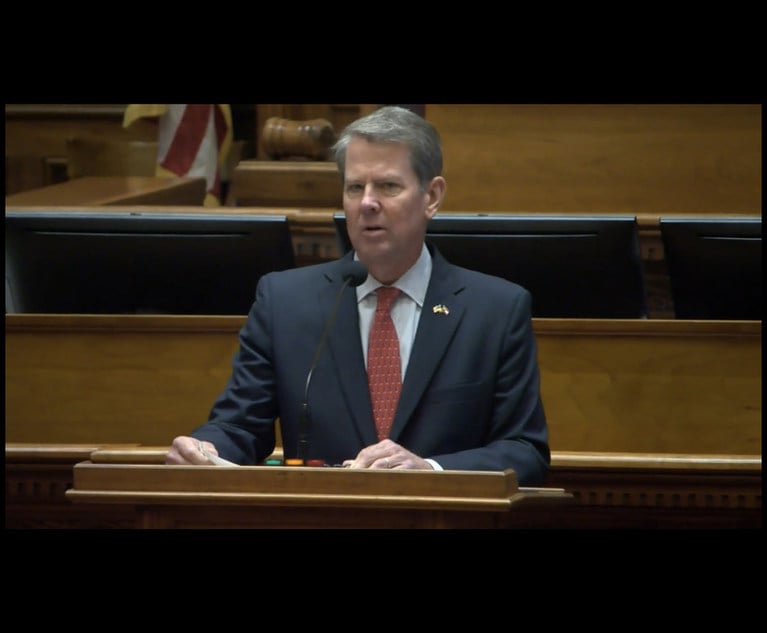Federal Judge Affirms City's Right to Bar Confederate Battle Flag From Parade
A Trump appointee ruled the city of Alpharetta was within its rights to stop the Sons of Confederate Veterans from carrying the Confederate battle flag in its annual Old Soldiers Day Parade.
June 26, 2020 at 06:55 PM
3 minute read
 Judge William Ray. (Photo: John Disney/ALM)
Judge William Ray. (Photo: John Disney/ALM)
Alpharetta city officials were within their rights to tell the Sons of Confederate Veterans they couldn't display the Confederate battle flag in the city's 2019 Old Soldiers Day Parade, a federal judge in Atlanta ruled Friday.
U.S. District Judge William "Billy" Ray of the Northern District of Georgia held that the parade—which was inaugurated after the Civil War and originally intended to recognize Confederate soldiers—was a form of government speech and, as such, the city was within its right to bar the SCV from carrying or displaying the Confederate battle flag.
"In addition to the expansion of the parade's honorees, society has evolved since the parade's formation and no longer holds the same degree of affinity for Confederate emblems and flags that previously existed," Ray said, especially because the battle flag has become a vehicle for "viewpoints and conduct that is otherwise considered offensive today."
"The city did not want to embrace any negative messages that the Confederate flag conveys to those who find the use of the flag to be offensive," he said. "The city was also concerned about the prospect of violence that could result if the SCV carried the Confederate flag in the parade, particularly in light of recent incidents in other parts of the country."
Michael Stacy of Atlanta's Bovis, Kyle, Burch & Medlin was lead counsel for the city of Alpharetta. Timothy Kyle King of Hodges McEachern, & King in Jonesboro represented plaintiffs Richard Leake, a member of the SCV's Roswell chapter, and Alpharetta resident Michael Dean, who also wanted to fly a Confederate flag in the parade.
The order from Ray—a former jurist on the Georgia Court of Appeals who was appointed to the federal bench by President Donald Trump in 2018—was the third this month by a Georgia court curtailing efforts to mythologize the defeated Confederacy and its symbols. On Juneteenth, DeKalb County removed a 30-foot-tall Confederate monument adjacent to the county courthouse to comply with a court order issued by Superior Court Judge Clarence Seeliger declaring it a public nuisance. On Monday, the U.S. Court of Appeals for the Eleventh Circuit stripped so-called Southern heritage groups and Confederate descendants of standing in their efforts to stop the relocation of a 75-foot-tall Confederate monument in Lakeland, Florida.
Last year, Ray declined to issue an emergency temporary restraining order sought by the SCV that would have overruled the city's battle flag ban. The Alpharetta parade took place Aug. 3 without the SCV's' participation. Last December, the city council and mayor adopted a resolution saying the city would no longer sponsor or financially support the parade, according to Ray's order.
"The city has historically utilized the parade to convey their public message of appreciation to American war veterans," Ray concluded. "The city's presence in the application process, advertising, and in the parade itself leads an observer to identify the speaker as the city. The city's financial and administrative control over the parade establishes that the city had direct control over the message disseminated to the public. The voice of the parade was that of the government, and the city was within its right to restrict the SCV's use of the Confederate flag so as to portray what the city thought to be appropriate for their message."
This content has been archived. It is available through our partners, LexisNexis® and Bloomberg Law.
To view this content, please continue to their sites.
Not a Lexis Subscriber?
Subscribe Now
Not a Bloomberg Law Subscriber?
Subscribe Now
NOT FOR REPRINT
© 2025 ALM Global, LLC, All Rights Reserved. Request academic re-use from www.copyright.com. All other uses, submit a request to [email protected]. For more information visit Asset & Logo Licensing.
You Might Like
View All
Panel to Decide if Governor Should Suspend Georgia Lawyer From Elected Post
4 minute read

Plaintiffs Attorneys Awarded $113K on $1 Judgment in Noise Ordinance Dispute
4 minute readTrending Stories
- 1Decision of the Day: Court Holds Accident with Post Driver Was 'Bizarre Occurrence,' Dismisses Action Brought Under Labor Law §240
- 2Judge Recommends Disbarment for Attorney Who Plotted to Hack Judge's Email, Phone
- 3Two Wilkinson Stekloff Associates Among Victims of DC Plane Crash
- 4Two More Victims Alleged in New Sean Combs Sex Trafficking Indictment
- 5Jackson Lewis Leaders Discuss Firm's Innovation Efforts, From Prompt-a-Thons to Gen AI Pilots
Who Got The Work
J. Brugh Lower of Gibbons has entered an appearance for industrial equipment supplier Devco Corporation in a pending trademark infringement lawsuit. The suit, accusing the defendant of selling knock-off Graco products, was filed Dec. 18 in New Jersey District Court by Rivkin Radler on behalf of Graco Inc. and Graco Minnesota. The case, assigned to U.S. District Judge Zahid N. Quraishi, is 3:24-cv-11294, Graco Inc. et al v. Devco Corporation.
Who Got The Work
Rebecca Maller-Stein and Kent A. Yalowitz of Arnold & Porter Kaye Scholer have entered their appearances for Hanaco Venture Capital and its executives, Lior Prosor and David Frankel, in a pending securities lawsuit. The action, filed on Dec. 24 in New York Southern District Court by Zell, Aron & Co. on behalf of Goldeneye Advisors, accuses the defendants of negligently and fraudulently managing the plaintiff's $1 million investment. The case, assigned to U.S. District Judge Vernon S. Broderick, is 1:24-cv-09918, Goldeneye Advisors, LLC v. Hanaco Venture Capital, Ltd. et al.
Who Got The Work
Attorneys from A&O Shearman has stepped in as defense counsel for Toronto-Dominion Bank and other defendants in a pending securities class action. The suit, filed Dec. 11 in New York Southern District Court by Bleichmar Fonti & Auld, accuses the defendants of concealing the bank's 'pervasive' deficiencies in regards to its compliance with the Bank Secrecy Act and the quality of its anti-money laundering controls. The case, assigned to U.S. District Judge Arun Subramanian, is 1:24-cv-09445, Gonzalez v. The Toronto-Dominion Bank et al.
Who Got The Work
Crown Castle International, a Pennsylvania company providing shared communications infrastructure, has turned to Luke D. Wolf of Gordon Rees Scully Mansukhani to fend off a pending breach-of-contract lawsuit. The court action, filed Nov. 25 in Michigan Eastern District Court by Hooper Hathaway PC on behalf of The Town Residences LLC, accuses Crown Castle of failing to transfer approximately $30,000 in utility payments from T-Mobile in breach of a roof-top lease and assignment agreement. The case, assigned to U.S. District Judge Susan K. Declercq, is 2:24-cv-13131, The Town Residences LLC v. T-Mobile US, Inc. et al.
Who Got The Work
Wilfred P. Coronato and Daniel M. Schwartz of McCarter & English have stepped in as defense counsel to Electrolux Home Products Inc. in a pending product liability lawsuit. The court action, filed Nov. 26 in New York Eastern District Court by Poulos Lopiccolo PC and Nagel Rice LLP on behalf of David Stern, alleges that the defendant's refrigerators’ drawers and shelving repeatedly break and fall apart within months after purchase. The case, assigned to U.S. District Judge Joan M. Azrack, is 2:24-cv-08204, Stern v. Electrolux Home Products, Inc.
Featured Firms
Law Offices of Gary Martin Hays & Associates, P.C.
(470) 294-1674
Law Offices of Mark E. Salomone
(857) 444-6468
Smith & Hassler
(713) 739-1250







